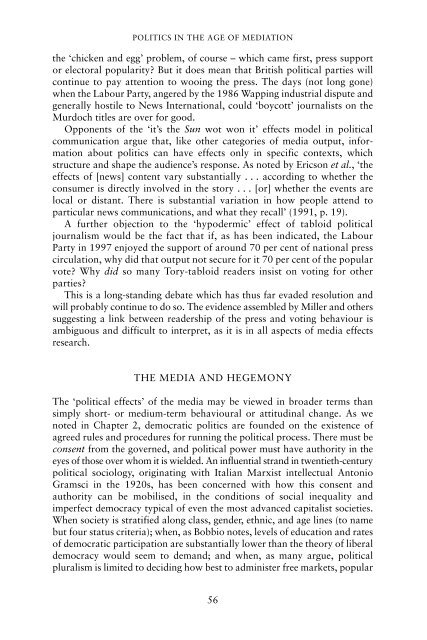20130412164339753295_book_an-introduction-to-political-communication
20130412164339753295_book_an-introduction-to-political-communication
20130412164339753295_book_an-introduction-to-political-communication
Create successful ePaper yourself
Turn your PDF publications into a flip-book with our unique Google optimized e-Paper software.
POLITICS IN THE AGE OF MEDIATION<br />
the ‘chicken <strong>an</strong>d egg’ problem, of course – which came first, press support<br />
or elec<strong>to</strong>ral popularity? But it does me<strong>an</strong> that British <strong>political</strong> parties will<br />
continue <strong>to</strong> pay attention <strong>to</strong> wooing the press. The days (not long gone)<br />
when the Labour Party, <strong>an</strong>gered by the 1986 Wapping industrial dispute <strong>an</strong>d<br />
generally hostile <strong>to</strong> News International, could ‘boycott’ journalists on the<br />
Murdoch titles are over for good.<br />
Opponents of the ‘it’s the Sun wot won it’ effects model in <strong>political</strong><br />
<strong>communication</strong> argue that, like other categories of media output, information<br />
about politics c<strong>an</strong> have effects only in specific contexts, which<br />
structure <strong>an</strong>d shape the audience’s response. As noted by Ericson et al., ‘the<br />
effects of [news] content vary subst<strong>an</strong>tially . . . according <strong>to</strong> whether the<br />
consumer is directly involved in the s<strong>to</strong>ry . . . [or] whether the events are<br />
local or dist<strong>an</strong>t. There is subst<strong>an</strong>tial variation in how people attend <strong>to</strong><br />
particular news <strong>communication</strong>s, <strong>an</strong>d what they recall’ (1991, p. 19).<br />
A further objection <strong>to</strong> the ‘hypodermic’ effect of tabloid <strong>political</strong><br />
journalism would be the fact that if, as has been indicated, the Labour<br />
Party in 1997 enjoyed the support of around 70 per cent of national press<br />
circulation, why did that output not secure for it 70 per cent of the popular<br />
vote? Why did so m<strong>an</strong>y Tory-tabloid readers insist on voting for other<br />
parties?<br />
This is a long-st<strong>an</strong>ding debate which has thus far evaded resolution <strong>an</strong>d<br />
will probably continue <strong>to</strong> do so. The evidence assembled by Miller <strong>an</strong>d others<br />
suggesting a link between readership of the press <strong>an</strong>d voting behaviour is<br />
ambiguous <strong>an</strong>d difficult <strong>to</strong> interpret, as it is in all aspects of media effects<br />
research.<br />
THE MEDIA AND HEGEMONY<br />
The ‘<strong>political</strong> effects’ of the media may be viewed in broader terms th<strong>an</strong><br />
simply short- or medium-term behavioural or attitudinal ch<strong>an</strong>ge. As we<br />
noted in Chapter 2, democratic politics are founded on the existence of<br />
agreed rules <strong>an</strong>d procedures for running the <strong>political</strong> process. There must be<br />
consent from the governed, <strong>an</strong>d <strong>political</strong> power must have authority in the<br />
eyes of those over whom it is wielded. An influential str<strong>an</strong>d in twentieth-century<br />
<strong>political</strong> sociology, originating with Itali<strong>an</strong> Marxist intellectual An<strong>to</strong>nio<br />
Gramsci in the 1920s, has been concerned with how this consent <strong>an</strong>d<br />
authority c<strong>an</strong> be mobilised, in the conditions of social inequality <strong>an</strong>d<br />
imperfect democracy typical of even the most adv<strong>an</strong>ced capitalist societies.<br />
When society is stratified along class, gender, ethnic, <strong>an</strong>d age lines (<strong>to</strong> name<br />
but four status criteria); when, as Bobbio notes, levels of education <strong>an</strong>d rates<br />
of democratic participation are subst<strong>an</strong>tially lower th<strong>an</strong> the theory of liberal<br />
democracy would seem <strong>to</strong> dem<strong>an</strong>d; <strong>an</strong>d when, as m<strong>an</strong>y argue, <strong>political</strong><br />
pluralism is limited <strong>to</strong> deciding how best <strong>to</strong> administer free markets, popular<br />
56
















